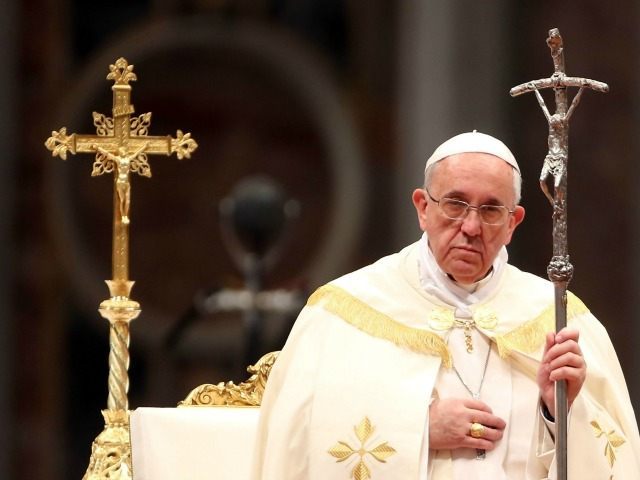In an impassioned appeal Sunday, Pope Francis called for an “international consensus” for the abolition of capital punishment, arguing that the commandment “Thou shalt not kill” has absolute value and includes both the innocent and the guilty.
After his weekly Angelus prayer, Pope Francis launched his appeal as a preparation for an international conference entitled “For a world without the death penalty,” which begins Monday in Rome. Conference organizers expect Ministers of Justice from 30 different countries to be present for the discussion.
“I hope that the symposium would give renewed impetus to the commitment to the abolition of capital punishment,” Francis said. He also said that a shift in public opinion toward opposition to the death penalty even as a legitimate means of defense of society is “a sign of hope.”
“Indeed, modern societies have the ability to deal with crime without permanently removing the chance for redemption from the one who has committed it,” he said. “The problem must be viewed in the context of a penal justice ever more in conformity with human dignity and God’s plan for man and society as well as a criminal justice policy open to the hope of reintegration into society.”
The Pope framed his appeal in the context of the Jubilee Year of Mercy, saying that this time of grace “is a propitious occasion to promote in the world ever more mature forms of respect for life and the dignity of every person.”
“Even a criminal keeps the inviolable right to life, the gift of God. I appeal to the conscience of rulers, so that we will achieve an international consensus for the abolition of the death penalty. And I propose to those among them who are Catholics to make a courageous and exemplary gesture by executing no sentence during this Holy Year of Mercy,” he said.
The Pope, who has regular contact with prison inmates and has visited prisons on several occasions during his pontificate, called on Christians everywhere to work toward better prison conditions.
“All Christians and people of good will are called today to work not only for the abolition of the death penalty, but also to improve prison conditions, in respect for human dignity of persons deprived of liberty,” he said.
For many centuries the Catholic Church has accepted the right of legitimate authority to have recourse to the death penalty in the case of certain heinous crimes, but beginning with the pontificate of Saint Pope John Paul II, has progressively narrowed the conditions under which it can be legitimately applied.
In 1995, John Paul published his encyclical letter Evangelium Vitae (The Gospel of Life), which marked a watershed in Catholic debate on this issue, both because of its authority (EV is the only papal encyclical to date dealing with capital punishment) and because of the teaching it offered regarding justification for the death penalty.
John Paul placed the problem of the death penalty in the context of legitimate defense, and declared that recourse to the death penalty should be limited to “cases of absolute necessity: in other words, when it would not be possible otherwise to defend society.”
The Pope also stated that because of steady improvements in the penal system, “such cases are very rare, if not practically non-existent” in the contemporary world.
The 1992 Catechism of the Catholic Church similarly taught that capital punishment should always be employed as a last resort.
“If bloodless means are sufficient to defend human lives against an aggressor and to protect public order and the safety of persons, public authority must limit itself to such means, because they better correspond to the concrete conditions of the common good and are more in conformity to the dignity of the human person.” (no. 2267)
In 2004, Cardinal Joseph Ratzinger—the future Pope Benedict XVI—stated that a good Catholic could be “at odds” with the Pope regarding the application of capital punishment, since it does not represent a moral absolute.
While the Church exhorts civil authorities “to exercise discretion and mercy in imposing punishment on criminals,” the Cardinal wrote, “it may still be permissible” to have recourse to capital punishment. “There may be a legitimate diversity of opinion even among Catholics about waging war and applying the death penalty,” he said, whereas this is not true “with regard to abortion and euthanasia,” which are moral absolutes.
In March 2015, Pope Francis went further still, arguing that the death penalty cannot be considered an application of legitimate self-defense.
In fact, he said, “when the death penalty is applied, persons are not killed in the act of aggression, but for damage committed in the past. Moreover, it is applied to people whose ability to harm is no longer present, but has already been neutralized and who are deprived of their liberty.”
“Today, the death penalty is inadmissible,” the Pope continued, “no matter how serious the crime of the offender. It is an offense to the inviolability of life and the dignity of the human person that contradicts God’s plan for man and society and His merciful justice.”
The death penalty “does not do justice to the victims, but encourages revenge,” he said.
Follow Thomas D. Williams on Twitter Follow @tdwilliamsrome

COMMENTS
Please let us know if you're having issues with commenting.